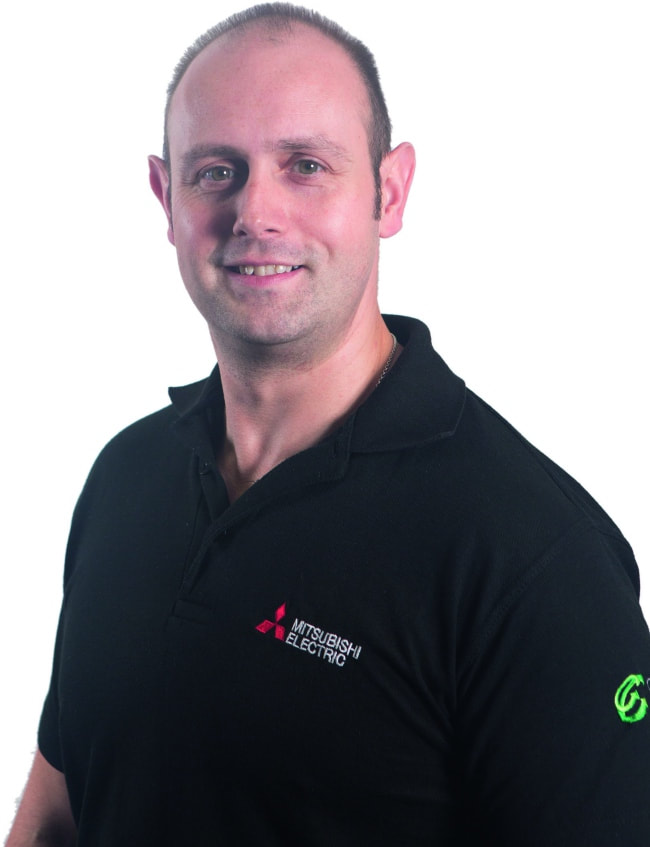02 May 2018
|
|
Ben Bartle-Ross of Mitsubishi Electric looks at the value of keeping your skills up to date.
We are in what I see as a really exciting period for the HVAC sector at the moment, with new technologies, refrigerants and new equipment regularly coming onto the market – and at the same time, legislation is focusing attention on the equipment that engineers are installing as never before |
Regulations such as F-Gas are forcing change throughout the industry as can be witnessed by the 700% price increase in R410A refrigerant in a very short space of time.
This is leading to new systems using R32 refrigerant as the industry grapples with the need to use refrigerants that reduce the global warming potential (GWP) of systems overall.
Manufacturers such as ourselves are also entering new sectors in a big way, with a whole new range of chillers, IT cooling and air handling unit products that could be seen as competing with our traditional air conditioning and VRF products.
And that’s even before you factor in the continuing growth of heat pump technology taken from the aircon industry to provide heating to the domestic and commercial sectors.
So just what is a traditional air conditioning engineer to make of all this change?
And how can you keep up to speed and ensure you gain the skills necessary to capitalise on what are significant opportunities for growth?
Ultimately, that is why I am a trainer because I love the fact that things simply do not stand still for very long in our industry.
That certainly keeps me on my toes, getting to grips with the latest product changes. It also means that I can spend time working out the best ways to arm the engineers who come through my training rooms to make sure that they can grasp the opportunities for their business from this change.
The thing to ask yourself
For me, the big question for any traditional air conditioning engineer is what additional skills they need to be learning or acquiring to help ensure they have the right tools in their arsenal to enable them to keep healthy and growing as a business.
One thing is certain though is that things are not standing still, so neither should you, otherwise you risk being left behind and missing out on the opportunities that other products and markets can offer.
So whether that is getting to grips with new refrigerants; gaining a better understanding of the water-side of HVAC and moving into new areas; increased knowledge on how to size a heat pump for heating; or just understanding the implications of current legislation such as MEES, ErP, F-Gas, or the RHI scheme, you need to decide what is important for your business.
The next step is then looking around at where you can acquire the skills necessary to future-protect yourself and your business.
I’m sure I can find you a relevant training session at one of our regional centres…
Ben Bartle-Ross is a Technical Trainer at Mitsubishi Electric.
This is leading to new systems using R32 refrigerant as the industry grapples with the need to use refrigerants that reduce the global warming potential (GWP) of systems overall.
Manufacturers such as ourselves are also entering new sectors in a big way, with a whole new range of chillers, IT cooling and air handling unit products that could be seen as competing with our traditional air conditioning and VRF products.
And that’s even before you factor in the continuing growth of heat pump technology taken from the aircon industry to provide heating to the domestic and commercial sectors.
So just what is a traditional air conditioning engineer to make of all this change?
And how can you keep up to speed and ensure you gain the skills necessary to capitalise on what are significant opportunities for growth?
Ultimately, that is why I am a trainer because I love the fact that things simply do not stand still for very long in our industry.
That certainly keeps me on my toes, getting to grips with the latest product changes. It also means that I can spend time working out the best ways to arm the engineers who come through my training rooms to make sure that they can grasp the opportunities for their business from this change.
The thing to ask yourself
For me, the big question for any traditional air conditioning engineer is what additional skills they need to be learning or acquiring to help ensure they have the right tools in their arsenal to enable them to keep healthy and growing as a business.
One thing is certain though is that things are not standing still, so neither should you, otherwise you risk being left behind and missing out on the opportunities that other products and markets can offer.
So whether that is getting to grips with new refrigerants; gaining a better understanding of the water-side of HVAC and moving into new areas; increased knowledge on how to size a heat pump for heating; or just understanding the implications of current legislation such as MEES, ErP, F-Gas, or the RHI scheme, you need to decide what is important for your business.
The next step is then looking around at where you can acquire the skills necessary to future-protect yourself and your business.
I’m sure I can find you a relevant training session at one of our regional centres…
Ben Bartle-Ross is a Technical Trainer at Mitsubishi Electric.
Content continues after advertisements









